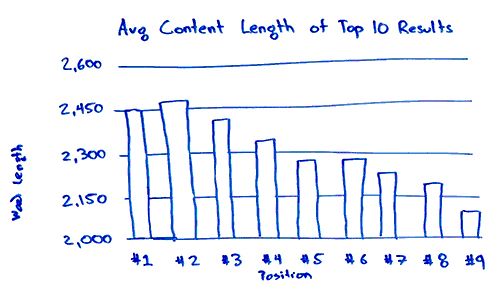
You may not know much about SEO, but you probably realize one thing by now: It’s a complicated animal that’s constantly changing. This can understandably make blogging for your business confusing. One of the biggest questions you may have is “What is the best length for blog posts?”
Blogging is an excellent way for both large and small companies to drive traffic to their websites’ landing pages. After all, a good blog can rank high in a search engine and thus bring in targeted, valuable organic traffic. Blogs also provide you with content that you can utilize in social media posts.
However, should your blogs be 500, or 1,000 words long or even longer? Here’s a rundown of what the best length for blog posts is in 2019 and what the blog length best practices are.
Let’s get started!
Why Blog Post Length Matters
So, why exactly is blog post length relevant? It’s important because it appears to correlate to higher Google, Bing and Yahoo rankings.
Google has always attempted to award the highest rankings to the best content. For this reason, many of Google’s top-ranking content items are longer, as the experts at Google naturally believe that the more detailed a piece is, the more likely it will feature the answers that users are looking for.
According to Moz, there is a direct correlation between content length and ranking. Check out their findings below:
 Image Source: “The Perfect Blog Post Length …” (Moz, 2017)
Image Source: “The Perfect Blog Post Length …” (Moz, 2017)
Of course, the reality is that not every user is looking for a long post, particularly for simple inquiries. Still, it appears that longer posts are generally in — at least for now.
But what exactly is “long”?
Research shows that the optimal blog post length is about 1,600 words. However, posts above 2,000 words in length appear to be shared often on social media.
In fact, just about every marketing guru acknowledges that viral articles’ average length is about 2,400 words.
So, the bottom line? A longer post will get you more of the results you want in terms of engagement, SEO and social shares.
Best Length for Blog Posts: What to Expect in 2019
In years past, 500-word blogs were typically the target. Nowadays, a length of 500 words is considered the minimum among SEO experts.
Why?
Because believe it or not, Google was primitive five years ago. Its algorithm was not particularly great at understanding website pages’ content, so it was incredibly dependent on links.
This meant search engine optimizers could easily manipulate search engine page results. Creating long content simply wasn’t necessary. And neither was creating content of value.
But oh how times have changed.
2019 Versus 2018
In 2018, the way to get to the top of search engine page results is to create detailed content that answers readers’ questions. In other words, your content absolutely has to be valuable.
A major change this year versus 2018, though, is that Google is working on transitioning to a new mobile-focused index.
What does this mean for you? It means Google will prioritize your company’s website if it is responsive, as over half of users today complete online searches on their mobile devices.
This, of course, poses a major question: Do smartphone readers truly want to read 2,000 words in a blog?
Evidence appears to suggest the opposite. In light of this, shorter blogs may very well become more in demand with Google’s mobile index in the future.
Still, even if you produce shorter content down the road, you’ll still need to make sure that the content isn’t thin. In other words, your content needs to be original — not a duplicate of what’s already out there. Otherwise, it will only work against you in the rankings race.
Benefits of a Longer Blog Post Length
For now, when it comes to the best length for blog posts, longer (around 1,500 words or more) is better for a number of reasons outside of simply pleasing Google and social media users.
For one, providing content that is original and unique is easier when your article is long. If you produce short content, it will be harder to differentiate it from other short content that has already been posted online.
Also, well-written long articles are more time consuming to read, which means users will spend much more time on your website than they would with a short blog. That’s exactly what you want.
Links and Ads
An additional benefit of writing on the longer side is that it’s easier to incorporate more links to the various pages of your website into a longer article than it is in a shorter one. This will help to keep your readers engaged as well as decrease your bounce rate. Your bounce rate is the percentage of site visitors who leave your website after looking at only one page.
Another perk of writing longer blog posts? If you decide to run contextual ads, you’ll be able to maximize your earnings. Here’s why.
First, you can include ads that are more relevant to your website blogs’ content. Second, you’ll have plenty of space to add ads without making the site appear to be full of advertisements. After all, a Web page with a 2,000-word blog and three ads typically looks more legitimate than one with a 300-word blog and the same number of ads.
More Dollars, Differentiation, and Detail
Yet another reason to produce longer blogs is that if you choose to sell your site in the future, you can demand more money for it. After all, it features lengthier blogs, which are not as easy to generate.
Writing longer posts may also help with differentiating your weblog from those of your competition. If most blogs in your company’s niche area publish medium or short blogs and you publish longer content that is valuable, you’ll gain a major SEO advantage over time. You can’t beat that.
The final and perhaps most obvious reason to shoot for a longer blog post length is that longer posts allow you to explain topics in greater detail. This means you’re more likely to keep your current and prospective customers happier. And happy customers are more likely to return to your site for more helpful content.
How to Produce Longer Content Easily
As mentioned earlier, producing longer posts clearly isn’t a simple process. However, here are a few tips for getting the job done in the most efficient manner possible.
First, before you commit to a certain publishing schedule, be sure to have several posts prepared in advance.
For example, maybe you want to publish two articles per week. In this situation, you should have a minimum of four posts completed before you begin publishing. This should give you plenty of time to stay on top of your schedule, even if you fall a little behind.
Next, figure out your blog post titles ahead of time. This will free up your blog writing time for actually writing — not trying to figure out topic ideas.
Third, try to break up a long blog into several sections featuring their own subheadings. On top of this, try to keep your paragraphs short. This will make writing the blog easier, but it’ll also make reading it easier for you.
Keep Keywords in Mind
Of course, in all of your lengthy blog writing, pay special attention to the keywords you’re using in the content.
If the average blog post for a certain keyword is just 200 words, it’s probably overkill to produce a 2,000-word blog post related to the keyword. You could probably easily rank in the number-one spot with a post that is 1,000 words long instead.
In fact, even 100 words might be enough if you’re writing a piece about when Kim Kardashian was born. The topic isn’t complicated, so there’s no need to complicate your blog. The searcher’s intent is important to consider in your blog writing.
In other words, don’t waste your time, energy and money on creating posts that are lengthier than necessary. Sometimes less is more.
What’s Trending on Google?
One of the best ways to determine your perfect blog post length? Search online for your focus keyword. Then, quickly analyze the lengths of the relevant blog posts topping your first search engine results page.
This is a quick and simple way to discover what Google wants to see for a certain topic.
For instance, let’s say you want to write a blog about losing weight without having to exercise. You search this topic on Google and count the lengths of the first five blogs on the topic. Their lengths are as follows:
- 2,600 words
- 700 words
- 1,400 words
- 1,100 words
- 1,800 words
Clearly, the word-count range is from 700 to 2,600 words, with the majority of the blogs being above 1,000 words. Therefore, if you keep your post near 1,700 words (this post is 1,500 words by the way), you should be good to go.
How I Can Help
I specialize in content marketing, SEO, and pay-per-click advertisements to drive traffic to companies’ websites. In other words, I am passionate about and adept at helping businesses to generate money via the internet, which is why I’ve outlined here what the best length for blog posts is and the blog length best practices.
Continue to follow our blog for more tips and tricks on SEO and all things digital marketing!

